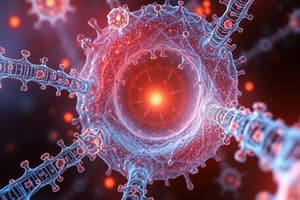Podcast
Questions and Answers
What type of organisms are made up of a single cell?
What type of organisms are made up of a single cell?
- Multicellular organisms
- Unicellular organisms (correct)
- Bacterial organisms
- Microscopic organisms
All living things are made up of multicellular organisms.
All living things are made up of multicellular organisms.
False (B)
What are the basic units of life?
What are the basic units of life?
Cells
Plant cells and animal cells take in food, release energy, get rid of waste, and __________.
Plant cells and animal cells take in food, release energy, get rid of waste, and __________.
Match the type of organism with its cell type:
Match the type of organism with its cell type:
Flashcards are hidden until you start studying
Study Notes
Cellular Organisation
- Cells are the fundamental unit of life, making up all living organisms.
- Organisms are categorized as unicellular (single-celled, e.g., bacteria) or multicellular (made up of many cells, e.g., animals and plants).
- Microscopic size of cells requires a microscope for observation.
- Both animal and plant cells share common functions such as nutrient absorption, energy release, waste elimination, growth, and reproduction.
- Structural differences exist between animal and plant cells, influencing their specific functions.
Animal Cells
- Typically lack a rigid cell wall, which allows for varied shapes.
- Contain several organelles, including mitochondria (energy production), lysosomes (waste processing), and endoplasmic reticulum (protein synthesis).
- Highly specialized types, such as nerve cells (neurons) for signal transmission and muscle cells for movement.
Plant Cells
- Feature a rigid cell wall that provides structural support and protection.
- Contain chloroplasts for photosynthesis, turning light energy into chemical energy.
- Have a large central vacuole that maintains turgor pressure, crucial for plant rigidity and nutrient storage.
Studying That Suits You
Use AI to generate personalized quizzes and flashcards to suit your learning preferences.




